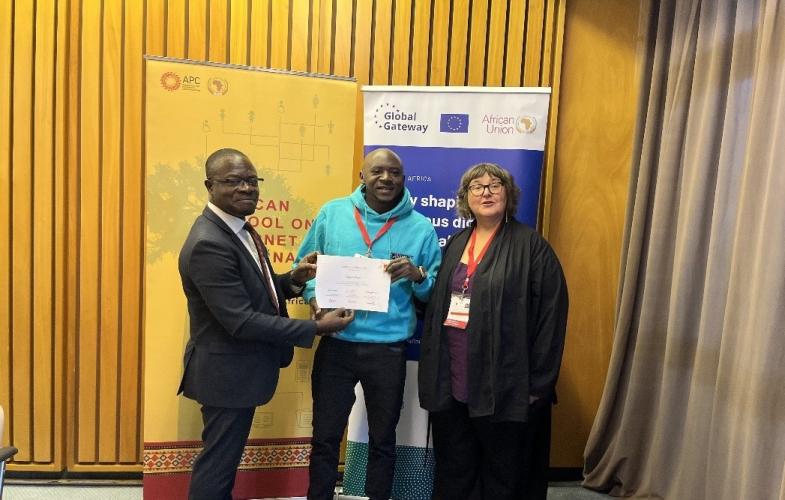
The world has truly become a global village, interconnected by digital technologies and the internet. As new technologies reshape our globe, Africa finds itself at the heart of an evolving digital transformation. This shift highlights the critical need for robust data governance as the continent embraces its digital economy aspirations.
In November 2024, I had the privilege of participating in the African School on Internet Governance (AfriSIG24) held in Addis Ababa, Ethiopia. Organised by the Association for Progressive Communications (APC), this regional event brought together thought leaders, policy makers and practitioners to discuss the intersection of internet governance, data governance and digital transformation. My heartfelt gratitude goes to the organisers for affording me this invaluable opportunity.
A focus on data governance
The thematic focus of AfriSIG24 was data governance, explored through interactive learning and knowledge-sharing sessions. These sessions delved into a wide array of critical topics, such as:
- Digitalisation, inclusion and inequality: Understanding how digital technologies can drive sustainable development while addressing disparities in access and opportunity.
- The global internet governance ecosystem: Examining Africa's institutional context in relation to national and regional frameworks for internet governance.
- Open internet architecture and infrastructure: Analysing the role of standards, protocols and internet resource management.
- Data as a strategic asset: Discussions on data protection, security, sovereignty, localisation and the African Union Data Policy Framework.
- Digital trade and the African Continental Free Trade Area (AfCFTA): Exploring the digital economy's potential within the AfCFTA Digital Trade Protocol.
- Emerging issues: Debating topics such as artificial intelligence (AI), climate change, digital sovereignty, and the geopolitics of internet governance.
- Human rights and the internet: Tackling challenges such as online gender-based violence, hate speech, misinformation and lack of media diversity.
These sessions laid a solid foundation for understanding how Africa can leverage data governance as a strategic enabler for digital development. They also reinforced the importance of addressing challenges like cybersecurity, inequality and human rights in the digital age.
The practicum: Bridging frameworks for a digital economy
One of the key highlights of AfriSIG24 was the practicum, a deep dive into the intersection between the African Union Data Policy Framework and the AfCFTA Digital Trade Protocol. This engaging exercise emphasised the importance of creating cohesive strategies that align data governance with trade policies to foster Africa’s digital economy.
As Africa transitions into a digitally driven economy, the need for harmonised policies becomes increasingly urgent. Data governance must be prioritised to enable seamless digital trade, safeguard data flows, and ensure sovereignty while maintaining global competitiveness. Contributing to this discussion was not only rewarding, but also underscored the value of collaboration in shaping Africa’s digital future.
Networking and collaboration
Beyond the enriching sessions, AfriSIG24 provided a unique opportunity to network with participants from across Africa. These interactions offered fresh perspectives on challenges and opportunities within the African digital ecosystem. Conversations spanned various topics, from internet access and affordability to gender justice and media independence.
The event also sparked potential collaborations among participants from different sectors. Together, we explored ways to address shared challenges and build cross-sectoral projects that can advance digital inclusion and innovation across the continent.
Key takeaways and looking ahead
Reflecting on AfriSIG24, one thing is clear: data governance is no longer a peripheral issue. It must be a core priority as Africa moves toward becoming a digital economy powerhouse. Robust data governance frameworks will enable the continent to harness data as a strategic asset, promote digital trade, and protect citizens' rights in the digital space.
Additionally, the event highlighted the importance of capacity-building initiatives such as AfriSIG in equipping individuals and organisations with the knowledge and skills to navigate the complex landscape of internet governance.
As I return to my work in digital innovations for sustainable development, the insights gained from AfriSIG24 will undoubtedly shape my approach to driving inclusive, equitable and sustainable digital transformation. The opportunity to engage with such a vibrant and diverse community of change-makers has reinforced my commitment to championing digital inclusion and data-driven development in Africa.
In conclusion, Africa’s digital future is bright, but its success hinges on our ability to prioritise and implement sound data governance policies. Collaborative efforts from stakeholders such as government, civil society, academia and the private sector are key to creating a digital ecosystem that benefits all Africans.
AfriSIG24 was not just an event, it was a call to action for a digitally inclusive Africa.
Peter Ongom is a tech professional, software engineer and researcher with vast experience in leveraging internet technologies for development. He is the programme officer for information sharing and networking at the Women of Uganda Network (WOUGNET). Peter has played a pivotal role in various projects that promote digital inclusion, internet governance and data justice, working across sectors like education, agriculture and governance. His main interests are advocating for inclusive internet access and equitable data practices, ensuring that digital technologies are a tool for development and gender equality across communities in Uganda and beyond.
